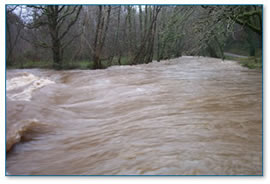the future
and water
 |
Clapper Weir 01-01-03
floods - River Lynher
“Floods are recorded more frequently” |
Changes in climate - that is;
air temperature; rainfall intensity (amount) and frequency (how
often); and wind direction and intensity - have all been recorded
through history as changing naturally. In the last century, however
humans have had a big impact on changes in the earth’s climate
and forecasts for continued change are increasing.
It was in the late 18th century
that the industrial revolution began and since then we have been
fuelling our industries by burning enormous amounts of oil, coal
and wood. This has released gases into the atmosphere, some of which
act as a blanket over the earth, trapping warm air and heating up
the environment. Other gases have damaged the protective layer between
the earth and the sun, reducing protection for life on earth from
the harmful rays of the sun.
Changes in climate will have
a big impact on water resources. Changes in rainfall patterns could
affect how much water is available for people and the environment.
In Cornwall there are times in the autumn, winter and spring when
it seems to rain every day, when water supply does not appear to
be a problem. There are also times, however, when no rain falls
for a long time! As a recent example, in the summer of 2002 there
was no rain for over a month! When this happens reservoirs, rivers,
streams, ponds, lakes and wetland areas all reduce in size and the
plants, animals and humans who rely on them for supplies of water
are affected.
 |
Reservoir –
high - Jan 03 |
When the weather is hot people
use more water, as in the summer time. Think about what would happen
if our summers got hotter still, there could be droughts in Britain
and how would other countries be affected? In this country people
may want to water their gardens more often so that the plants do
not die. People themselves will drink more water to cool themselves.
Their bodies will be sweating, and so losing water, they may bath
or shower more often.
Everybody can help to slow down
climate change by making changes in their own lives. We can all
reduce the fossil fuels burnt for us by travelling less, buying
fewer processed goods and living simpler lives. By doing these things
we are helping to limit the amount of gases released into the atmosphere.
We can also limit our impact
on valuable resources like water, by using water more efficiently.
If we reduce waste we are looking after an important resource, vital
in our lives and in the lives of the plants and animals with whom
we share our environment.
See the Water Efficiency Summary Sheet (E06a)
Go to the Rainfall and Saving Water exercise
(E08c) and the Water
Audit (E08d + E08e)
pages in this section to find out what you can do to help
|

